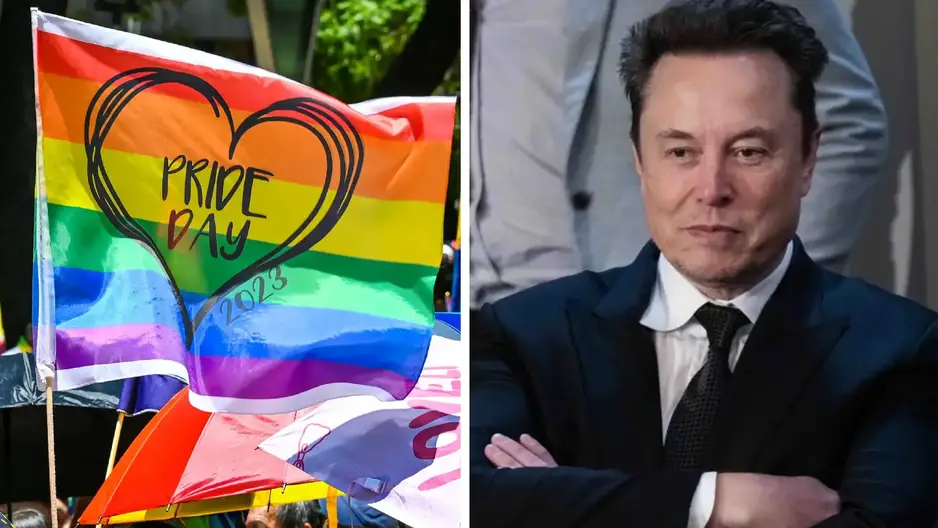Elon Musk has found himself at the center of another social media firestorm, this time for X’s new policy limiting the visibility of Pride-related content. Musk defended the decision in his signature blunt style, tweeting, “It’s not good for kids,” as the platform began de-prioritizing LGBTQ+ hashtags, ads, and posts. The move has drawn sharp criticism from activists, celebrities, and users who accuse Musk of rolling back progress in inclusivity, while some conservative voices are hailing him as a “defender of family values.”
Under the new policy, content promoting Pride Month, LGBTQ+ rights, or inclusive messaging will be flagged as “age-sensitive,” reducing its reach and visibility. Musk claimed the decision was about “protecting young minds,” but critics argue it sends a dangerous message that equates LGBTQ+ visibility with something inappropriate for children.
In a late-night announcement, Musk explained the rationale behind the decision: “Social media platforms have a responsibility to ensure that kids are exposed to ideas appropriate for their age. While everyone’s welcome on X, we have to draw the line somewhere.”
The changes include de-emphasizing popular hashtags like #Pride and restricting ads featuring rainbow imagery or LGBTQ+ messaging. The policy has already taken effect, with users reporting reduced engagement on posts celebrating Pride.
Musk doubled down on his stance, stating, “This isn’t about targeting anyone—it’s about protecting kids. Period.”
The backlash was swift and overwhelming. LGBTQ+ advocacy groups and allies accused Musk of using “protecting children” as a thinly veiled excuse to stoke cultural divides. The decision has reignited debates over the role of tech platforms in fostering inclusivity versus enforcing neutrality.
“Visibility saves lives,” tweeted LGBTQ+ advocate and actor Elliot Page. “By censoring Pride content, Musk is telling LGBTQ+ youth that their existence isn’t appropriate. That’s harmful, plain and simple.”
Many users pointed out the irony of Musk, a self-proclaimed free speech advocate, implementing policies that restrict a community’s ability to express themselves. “So much for the ‘town square for everyone,’” one user wrote. “Guess Musk’s free speech only applies to who he likes.”
Even advertisers weighed in, with several major brands hinting at reevaluating their partnerships with X. “We stand with the LGBTQ+ community and are deeply concerned about these developments,” read a statement from a global brand that declined to be named.
While the backlash dominated headlines, Musk’s move also garnered praise from conservative voices who see the policy as a long-overdue pushback against “woke culture.” Right-wing commentators celebrated the decision as a stand for “traditional values” and urged other platforms to follow suit.
“Finally, a tech CEO who gets it,” tweeted a prominent conservative influencer. “Kids need to be kids—not indoctrinated with adult agendas.”
Fox News ran multiple segments applauding the decision, with one pundit declaring, “Musk is doing what other CEOs are too scared to do: protecting the next generation.”
For LGBTQ+ users, the policy feels personal. Many described it as a gut punch, particularly for younger members of the community who rely on social media for support and connection.
“This platform was a lifeline for me when I was coming out,” said one user. “Now it feels like they’re trying to shove us back in the closet.”
Others fear the ripple effects could extend beyond X, emboldening other companies or institutions to roll back LGBTQ+ visibility. “When a platform this big sends a message that Pride content is inappropriate, it sets a dangerous precedent,” said activist Maya Torres. “This isn’t just about hashtags—it’s about human lives.”
True to form, Musk didn’t shy away from the controversy, responding to critics with a mix of sarcasm and defiance. “Free speech doesn’t mean free-for-all,” he tweeted. “Some things just aren’t appropriate for kids. Get over it.”
In another post, Musk mocked the backlash, writing, “Imagine thinking banning rainbow hashtags is the end of democracy. Twitter drama level: 10/10.”
His comments only added fuel to the fire, with many accusing him of trivializing a deeply important issue. “It’s not about hashtags,” one activist replied. “It’s about visibility and survival for LGBTQ+ people.”
The controversy has left X in a precarious position. Several brands with strong LGBTQ+ commitments have hinted at pulling their ads from the platform, citing concerns over Musk’s increasingly polarizing policies.
“Brands want to align with platforms that reflect their values,” said marketing analyst Laura Greene. “Musk’s decision could alienate key advertisers and cost X millions in revenue.”
Others pointed out that X can ill afford to lose more advertisers, given its struggles with declining ad revenue and increased competition from platforms like Threads. “This could be the tipping point for brands already on the fence,” Greene added.
The controversy has reignited debates about the role of tech platforms in shaping cultural narratives. Should platforms like X actively promote inclusivity, or should they focus on neutrality to avoid alienating users?
“Tech companies have a choice,” said media studies professor Dr. Angela Reid. “They can be leaders in fostering inclusion, or they can pander to the loudest voices in the room. Musk has clearly made his choice.”
Critics argue that labeling Pride content as “inappropriate for children” perpetuates harmful stereotypes and undermines efforts to normalize LGBTQ+ identities. Supporters counter that not every topic belongs in the digital spaces frequented by minors.
As the fallout continues, X faces mounting pressure to clarify its policies and address user concerns. For now, the platform appears committed to its new direction, with Musk showing no signs of backing down.
Whether the decision proves to be a savvy move or a costly misstep remains to be seen. But one thing is certain: Elon Musk’s X has once again positioned itself at the heart of a cultural controversy, with no shortage of opinions on either side.
As one user aptly summarized, “Elon Musk wanted to make X a free-speech utopia. Instead, he’s turned it into a battleground. And the war is far from over.”






